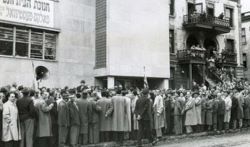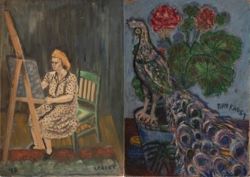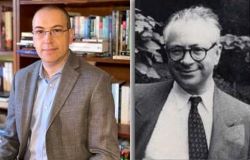
When was the last time you sat down and read an entire book of poetry? For many of us, I’m guessing, poetry just isn’t part of the regular reading diet. (I know it’s true for me.) National Poetry Month, celebrated every April since 1996, is a good reminder that there’s plenty of great poetry out there, and reading it is bound to be rewarding. But Yiddish poetry is far less frequently translated than Yiddish prose, even though the amount of Yiddish poetry that’s been written and published is vast. So, in honor of National Poetry Month—and because reading poetry is always a good idea—we’re going to highlight some of the more poetic items in our collection. Pull up your comfiest chair, relax, and enjoy!
Approaching the Asymptote
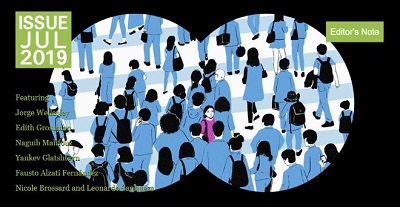
Although it doesn’t happen quite as often as we’d like, Yiddish poetry does receive recognition from the wider literary world. In its summer 2019 issue, the literary journal Asymptote devoted an entire section to Yiddish poetry, including translations of work by Yankev Glatshteyn, Itzik Manger, Debra Vogel, and Yermiyahu Ahron Taub, among others. On this episode of The Shmooze podcast, Alexander Dickow and Asymptote editor in chief Lee Yew Leong talk about editing that special edition.
Listen to a podcast episode with Alexander Dickow and Lee Yew Leong
Creating the Canon
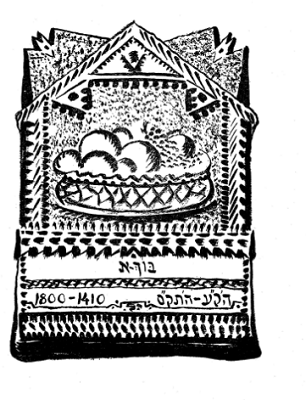
Most of us read poetry in poetry anthologies—I have more than a few still hanging around from my undergraduate days. That’s not a bad thing per se; anthologies help select the choicest bits for readers who may not have the time or interest to comb through an author’s complete works, and for better or worse they also help create the poetic canon. The first such effort in Yiddish was the grandly titled Antologye: finf hundert yor yidishe poezye (Anthology: 500 Years of Yiddish Poetry), edited by Morris Bassin in 1917. While people still complain about Bassin’s choices, it was a landmark publication and is still worth skimming, if not reading in full.
Read Morris Bassin’s 500 Years of Yiddish Poetry in the Steven Spielberg Digital Yiddish Library
Filling the Gaps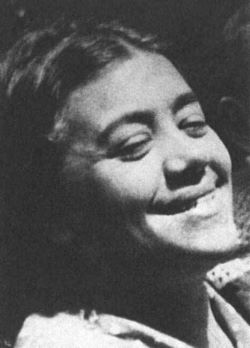
As good as Bassin’s anthology is, it has one glaring oversight: it didn’t include enough women. That was partially rectified in 1927 by Ezra Korman’s Yidishe dikhterins, an anthology exclusively devoted to women Yiddish poets. This lacuna continues to be filled today with the discovery (or rediscovery) of some of the most notable poets in Yiddish literature. One of these is Celia Dropkin, who was skewered by critics in her time for writing unashamedly about sex and women’s bodies.
Read an essay about Celia Dropkin by translator Faith Jones
Watch an oral history interview with Dropkin’s granddaughter, Elizabeth Starčević
Den Mother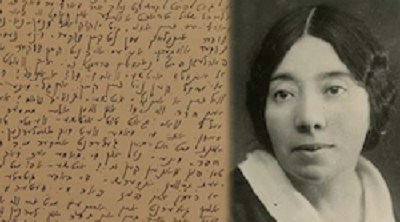
Another writer who has only recently been getting her due is Ida Maze, known as the “Den Mother” of Yiddish Montreal. The Center’s White Goat Press recently published a translation of Maze’s autobiographical novel, Dineh, but in her lifetime Maze was better known as a poet. The following pair of poems, included in the most recent translation issue of Pakn Treger, comes from Maze’s 1954 collection Vaksn mayne kinderlekh: muter un kinder-lider (And My Children Grow: Mother and Child Poems), which won the Congress for Jewish Culture’s prize for children’s literature in 1955.
Read two poems by Ida Maze in English translation
Watch a film about Maze from the Center’s Wexler Oral History Project
Going West
The Eastern European landscape, both natural and social, has always been a ripe subject for Yiddish poetry, as has immigrant life in urban centers like New York. But Los Angeles? The City of Angels might not seem like the most obvious choice for a Yiddish poet, but it was for Israel Emiot. “Los Angeles,” written late in Emiot’s life, is secular, artful, intricate, and very modern in form and content. Yet Emiot’s connections to his past, to Yiddish literary traditions, and to his fellow writers is evident.
Read Israel Emiot’s “Los Angeles” in Yiddish and English
Smooth as Stone
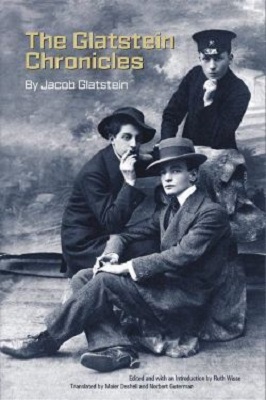
One of the most celebrated—and one of my own favorite—Yiddish poets of the twentieth century is Yankev Glatshteyn. If you’re interested in reading some of Glatshteyn’s prose, you could join the Center’s Great Jewish Books Club, which will soon be reading The Glatstein Chronicles, a semi-autobiographical account of his trip from America to Europe in the 1930s to visit his dying mother. And if you’re interested in hearing from the poet himself, you can listen to this program in honor of his seventy-fifth birthday, recorded in 1971 at the Jewish Public Library in Montreal.
Join the Yiddish Book Center’s Great Jewish Books Club
Listen to a birthday celebration with Yankev Glatshteyn
Man Out of Time
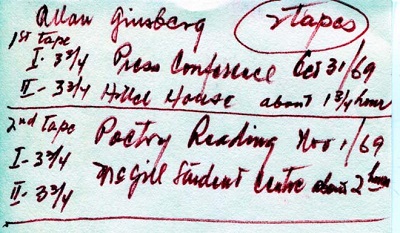
The audio archives of the Montreal JPL are full of poetic treasures, both expected and otherwise. In going through the recordings, the Center’s Zeke Levine stumbled upon a name he didn’t expect to see: Allen Ginsberg. In this piece Zeke excerpts and discusses the most captivating parts of a two-night series with Ginsberg, hosted by the McGill Hillel in 1969.
Read about, and listen to, Allen Ginsberg in Montreal
oin us!
COMMUNITY OPEN HOUSE
Learn more
Sunday, April 16, @ 10 a.m. to 4 p.m. ET
TALK | Undzer Biblyotek: Montreal’s Jewish Public Library at the Center of Yiddish Culture, with Sebastian Schulman, Rivka Augenfeld, and Sonia Bloom
Register
Thursday, April 20 @ 7 p.m. ET
CONVERSATION | From a Polish Shtetl to Yiddish New York: The Life and Work of Ray Faust, Artist Extraordinaire, with Barbara Kirshenblatt-Gimblett and Barry Faust
Register
Thursday, April 27 @ 7 p.m. ET
TALK | East European Jews between Renaissance and Futurelessness, with Kenneth Moss
Register
Thursday, May 4 @ 7 p.m. ET
All of our programs and publications are made possible with the support of our members. Please, won’t you click the button below to give what you can today?
Donate A hartsikn dank—Our heartfelt thanks!
Search Our Collections on Your Own
To search our site, go to yiddishbookcenter.org and click the magnifying glass in the upper right-hand corner. Place your cursor where it says “Search” on the left, and type in any term you’re looking for—a word, phrase, person, place, or subject. In a matter of seconds our “search engine” will look through millions of pages and give you a list of every item—book, tape, video, or more—that meets your criteria. Click on an item that interests you and plutsem, just like that, the full content will appear on your screen, completely free of charge.


